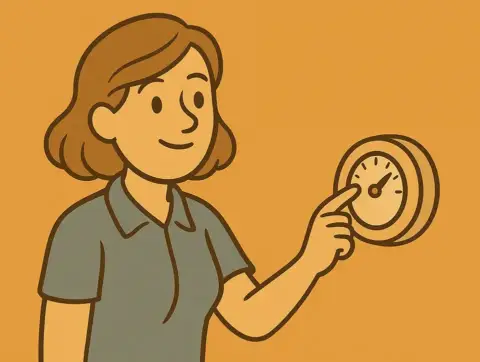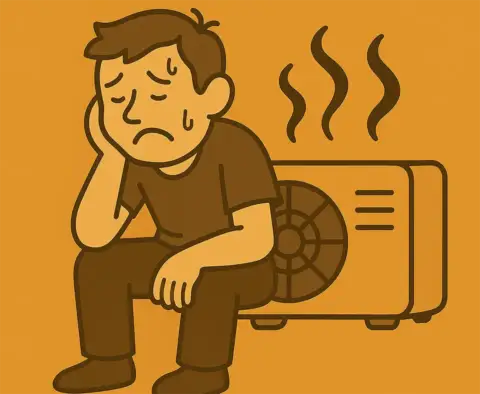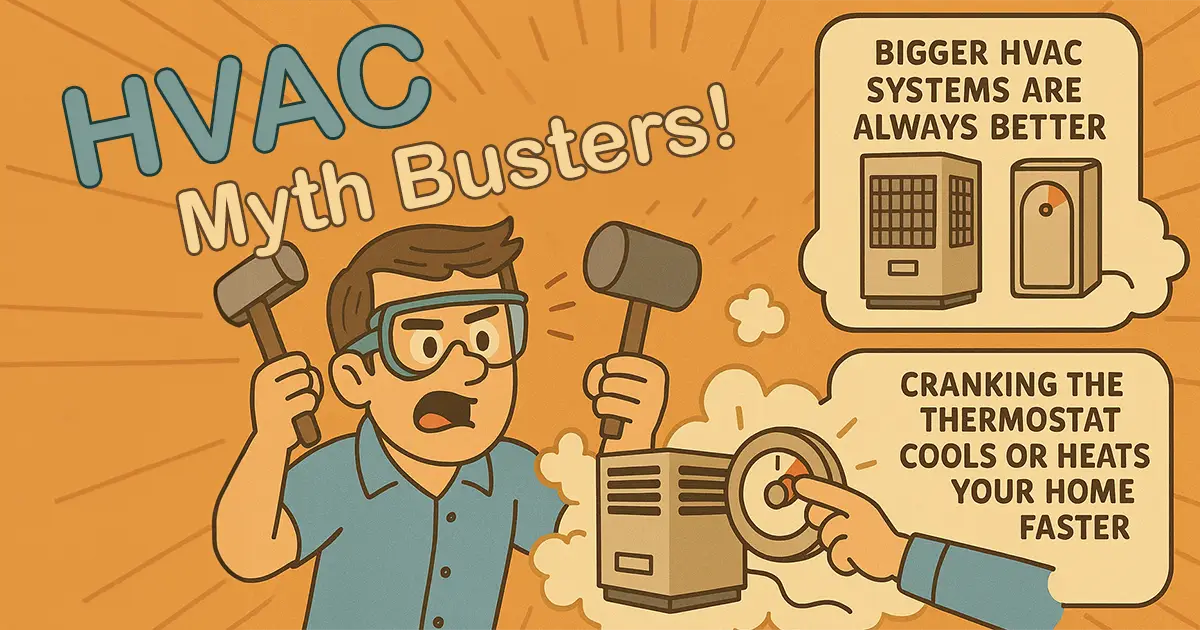When it comes to keeping your home comfortable all year, your HVAC system plays a starring role. Unfortunately, the internet (and even well-meaning neighbors) are filled with bad advice and outdated beliefs about how heating and cooling systems really work. These HVAC myths might seem harmless, but in reality, they could be driving up your energy bills, putting stress on your system, and leaving your home less comfortable than it could be.
At Greers Ferry Heat & Air, we believe that informed homeowners make smarter, more cost-effective decisions. So today, we’re busting seven of the most common HVAC myths we hear from customers right here in central Arkansas. Let’s set the record straight—and help you get the most out of your heating and cooling system.
Myth: Bigger HVAC Systems Are Always Better
It’s easy to think that a larger HVAC unit would heat or cool your home faster and more efficiently. After all, bigger means more power, right? Well, not exactly.
Why Bigger Isn’t Better
An oversized HVAC unit can actually create more problems than it solves. When a system is too powerful for your home, it runs in short bursts (a problem known as “short cycling”) and never reaches its optimal performance level. This constant on-off cycle puts unnecessary wear and tear on your system, leading to frequent repairs and a shortened lifespan.
Plus, when your air conditioner doesn’t run long enough, it can’t effectively remove humidity. That means your home might feel cold and clammy, not the cozy environment you aimed for.
What You Should Do Instead
The most efficient HVAC system is one that’s appropriately sized for your specific home. That includes factors like:
- Square footage
- Insulation levels
- Number and size of windows
- Ceiling height
- Local climate (yep, Greers Ferry summers count!)
A licensed technician from Greers Ferry Heat & Air can perform a professional load calculation to determine exactly what size unit your home needs. Trust us—it’s not something you want to guess on.
Myth: Closing Vents in Unused Rooms Saves Energy
Many homeowners try to save money by closing off vents in rooms they don’t use often, like guest bedrooms or basements. While this seems logical, it actually disrupts the airflow your system was designed to manage.
Why This Backfires Your HVAC system is balanced to move air throughout your entire ductwork system. When you block that airflow by shutting vents, pressure builds up inside the ducts. Over time, this can cause:
- Air leaks at seams
- Strain on your blower motor
- Uneven temperatures in the rest of the house
- Reduced energy efficiency
Think of it like pinching the end of a garden hose… the pressure increases, but the flow suffers.
Smarter Alternatives
Instead of closing vents, consider zoning systems that allow different areas of your home to be controlled independently, programmable thermostats to reduce HVAC activity during certain times of the day and improving insulation and sealing air leaks to make each room more energy-efficient.
Myth: Cranking the Thermostat Cools or Heats Your Home Faster
Feeling hot and sticky? It’s tempting to set the thermostat way down to 60°F in hopes of cooling the house faster. But your HVAC system doesn’t work like a car accelerator—it runs steadily until the target temperature is reached.
What Really Happens Whether you set your thermostat to 72°F or 60°F, your system will operate at the same speed. Setting it excessively low doesn’t make it work faster—it just runs longer, using more energy than necessary and possibly making your home too cold before you realize it.
A Better Approach Set your thermostat to the desired temperature (e.g., 72°F). Use a programmable or smart thermostat to create temperature schedules that match your lifestyle. And don’t forget to keep blinds or curtains closed during peak sun hours in the summer to reduce heat gain.
Want extra help managing temperatures efficiently? Ask us about smart thermostat installation!
Myth: The Thermostat Location Doesn’t Matter

Here’s a detail most homeowners never consider: where your thermostat is installed can significantly impact your comfort and energy bills.
Why Location Is Important
Thermostats measure the air around them to decide when to turn your HVAC system on or off. If yours is placed near a window, in direct sunlight, or near an appliance that gives off heat, it might get an inaccurate reading. That could cause your system to run longer than necessary… or not long enough.
Best Practices for Thermostat Placement
Install on an interior wall, about 5 feet from the floor. Avoid locations near direct sunlight, drafts, or heat sources. Keep it away from kitchens, windows, and exterior doors.
A poorly placed thermostat can cost you hundreds over time. If you’re unsure about yours, Greers Ferry Heat & Air can assess it during a service visit and recommend the best location.
Myth: You Only Need to Change Your Air Filter Once a Year
This one makes HVAC pros like us cringe. Your air filter is one of the simplest yet most important components of your system—and it needs regular attention.
The Risks of a Dirty Filter
An old or clogged air filter restricts airflow, making your system work harder to push air through your home. That can lead to:
- Higher energy bills
- More frequent repairs
- Poor indoor air quality (especially for allergy sufferers)
- Premature system failure
How Often Should You Change It? A good rule of thumb is every 1 to 3 months, but it depends on the type of filter your system uses, whether you have pets, as well as local pollen and dust levels. If anyone in the home has allergies, then it needs to be changed twice as often.
Homes in Greers Ferry that experience heavy pollen in the spring or pet-friendly households might need more frequent replacements.
Tip: Set a reminder on your phone or tie it to a monthly chore like paying bills.
Myth: Turning Off Your AC When You Leave Saves More Energy
We get it… no one wants to pay to cool an empty house. But turning off your air conditioner completely isn’t the energy-saving hack it seems to be.
Here’s the Catch When your AC is off all day, your home heats up. Then, when you return and turn it back on, the system has to work extra hard (and for a longer time) to bring temperatures back down—using a lot of energy in the process.
The Smarter Move Use a programmable thermostat to set your temperature a few degrees higher while you’re away—say, 78°F instead of 72°F. Then, program it to start cooling again 30 minutes before you get home. That way, you’ll save energy and walk into a comfortable home.
Myth: HVAC Maintenance Is Only Necessary When Something Breaks
If it’s not broken, why fix it? That thinking might work for some things, but not your HVAC system.
Why Preventative Maintenance Pays Off

Your heating and cooling system is one of the most expensive components in your home. Skipping routine service can lead to the following:
Unnoticed minor issues that turn into big, costly problems:
- Lower energy efficiency over time
- More frequent breakdowns
- A shorter system lifespan
Think of it like getting an oil change for your car. Regular tune-ups keep everything running smoothly and help prevent costly repairs.
What We Do During a Tune-Up
- Clean coils and burners
- Check refrigerant levels
- Inspect electrical connections
- Replace filters (if needed)
- Test airflow and system efficiency
At Greers Ferry Heat & Air, we offer affordable maintenance plans that make this easy to keep up with—ask us about it next time we visit!
Final Thoughts
There’s a lot of outdated or just plain wrong information about heating and cooling systems. But now that you know the truth behind these common HVAC myths, you can make smarter choices that keep your home more comfortable, your energy bills lower, and your system running longer.
Whether replacing your air filter, programming your thermostat, or getting a system tune-up before peak season hits, a few small changes can have a big impact.
If you need help with your HVAC system, Greers Ferry Heat & Air is here for you. We’re proud to serve homeowners in Greers Ferry, Heber Springs, and the surrounding areas with honest advice, dependable service, and expert care. Whether you’re looking to schedule seasonal maintenance, upgrade your thermostat, or troubleshoot an HVAC issue, our certified technicians are just a call away!

